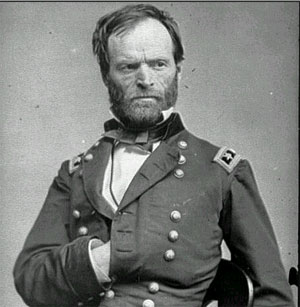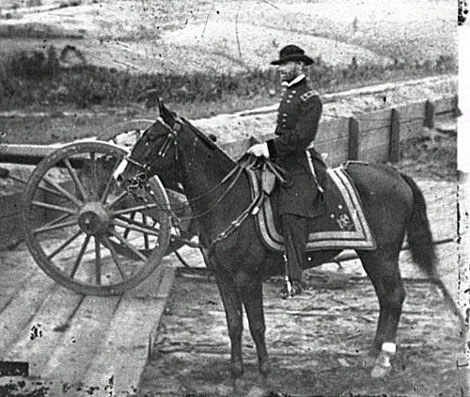
William Tecumseh Sherman
Best known for his “March to the Sea” during the Atlanta campaign, William Tecumseh Sherman was born in Lancaster, Ohio on February 8, 1820.
His father died when he was young and, unable to care for her son, his mother sent him to live with a man who had been a friend of his father’s, by the name of Thomas Ewing. He later married Mr. Ewing’s daughter.
Sherman graduated sixth in his class from West Point in 1840. He served in California during the Mexican War, earning a brevet, but resigned in 1853 as a captain and commissary officer.
The next few years were not entirely successful ones, as he failed in banking and the law.
Sherman was appointed by Governor J. Neely Johnson as Major General commanding the San Francisco division of the California Militia in 1856 during an insurrection, but resigned his commission after being refused support from his commanding officer.
In 1859, he was appointed superintendent of a military academy that is now Louisiana State University, but he resigned his post when Louisiana seceded, working for a time as head of a streetcar company in St. Louis before volunteering for the Union Army.
On May 8, 1861, Sherman wrote to the Secretary of War, offering his services for three years. Not wanting to become a political general, he accepted the grade of Colonel in the 13th Regular Infantry.
He assumed command of a brigade in the 1st Division of McDowell’s army under the command of Brig. General Daniel Tyler. His brigade, stationed at a stone bridge during the 1st Battle of Bull Run, retreated under Confederate cannon fire.
In August of 1861, Sherman was promoted to Brig. General and assigned to the Department of the Cumberland under the command of Brig. General Robert Anderson, who had been in command of Fort Sumter when Beauregard fired upon it, beginning the American Civil War.
 In October 1861, Sherman relieved Anderson as commander of the Department of the Cumberland.
In October 1861, Sherman relieved Anderson as commander of the Department of the Cumberland.
After evaluating the situation, Sherman told Secretary of War Cameron that if he had 60,000 men, he could drive the enemy of Kentucky; and if he had 200,000 men, he could end the war in that section. When Cameron reported that Sherman had asked for 200,000 men, one of the leading newspapers charged that Sherman must be “crazy” to demand so large a force.
The charge stuck, and it was widely believed that Sherman was crazy. Due to political and public pressure, Sherman was replaced by Brig. General Don Carlos Buell, and assigned to the Department of the West under Major General Halleck.
In February of 1862, Sherman was given command of the post at Paducah, Kentucky, relieving General Grant of that position. In March of that year, Halleck was assigned the command of the Department of the Mississippi, and General Grant to command the army in the field. The name given to this army was the Army of the Tennessee, and Sherman was assigned command of the 5th Division of this army.
The Army of the Tennessee saw its first battle at Shiloh. With untrained troops, the Union lost the first day’s battle but, reinforced by Buell and the Army of the Cumberland, routed the Confederate troops on the second day.
Praised by Grant, Sherman was promoted to Major General, and assigned to command the District of Memphis in July of 1862. Later that year, he was criticized for failing to seize the Confederate stronghold at Vicksburg, but redeemed himself as a part of the campaign that captured that city in July of 1863.
Sherman was given command of the Army of the Tennessee in the fall of 1863, and fought in the Battle of Chattanooga, where his troops unsuccessfully attacked those of Pat Cleburne on Missionary Ridge.
In the spring of 1864, Sherman was made supreme commander of the Armies of the West, and was ordered by Grant to “create havoc and destruction of all resources that would be beneficial to the enemy.” Thus began the Atlanta Campaign, for which Sherman became both famous and infamous, depending on perspective.
Sherman found fierce resistance from Confederate troops under the command of General Joe Johnston, but the strength of the Union armies, combined with their ability to resupply themselves, proved too much for the Confederates.
Johnston defeated the Union at the Battle of Kennesaw Mountain on June 27, 1864, but then had to withdraw to Smyrna.
CSA President Davis relieved Johnston of his command, replacing him with General John B. Hood in July of that year; but Hood proved unsuccessful against Sherman’s advancing Union troops.
Sherman captured Atlanta, Georgia, on September, 1864. Declared a military encampment, Sherman ordered all civilians to leave the city, making arrangements with Hood for safe passage of its civilian population. For the next month, Sherman was on the defensive, as Hood made several unsuccessful attempts at recapturing the city.
When Hood elected to march northward, Sherman began preparation for his march to the sea.
Keeping 60,000 of his most seasoned veterans, he sent the remainder of his troops back to Nashville to reinforce the force of Major General Thomas.
After setting fire to Atlanta munitions factories, railroad yards, clothing mills, and anything else thought to be useful to the Confederacy, with four corps in two columns, Sherman cut a swath 60 miles wide marching toward Savannah, destroying anything that could be useful to the Confederacy.
On December 23, 1864, Sherman sent a telegram to U.S. President Lincoln that he was presenting him with the city of Savannah as a Christmas gift.
Following the conquest of Savannah, Sherman’s troops fought the Confederates, again under the command of General Johnston, through the Carolinas.
Lee surrendered to Grant on April 9, 1865. General Johnston surrendered to Sherman on April 17, 1865, at Raleigh, North Carolina.
After the American Civil War, Sherman was commissioned Lieutenant General in the regular army, vacating his volunteer commission; and was promoted to full General upon Grant’s election to the Presidency.
He retired in 1883, moving to New York City, where he lived until his death on February 14, 1891.
 |